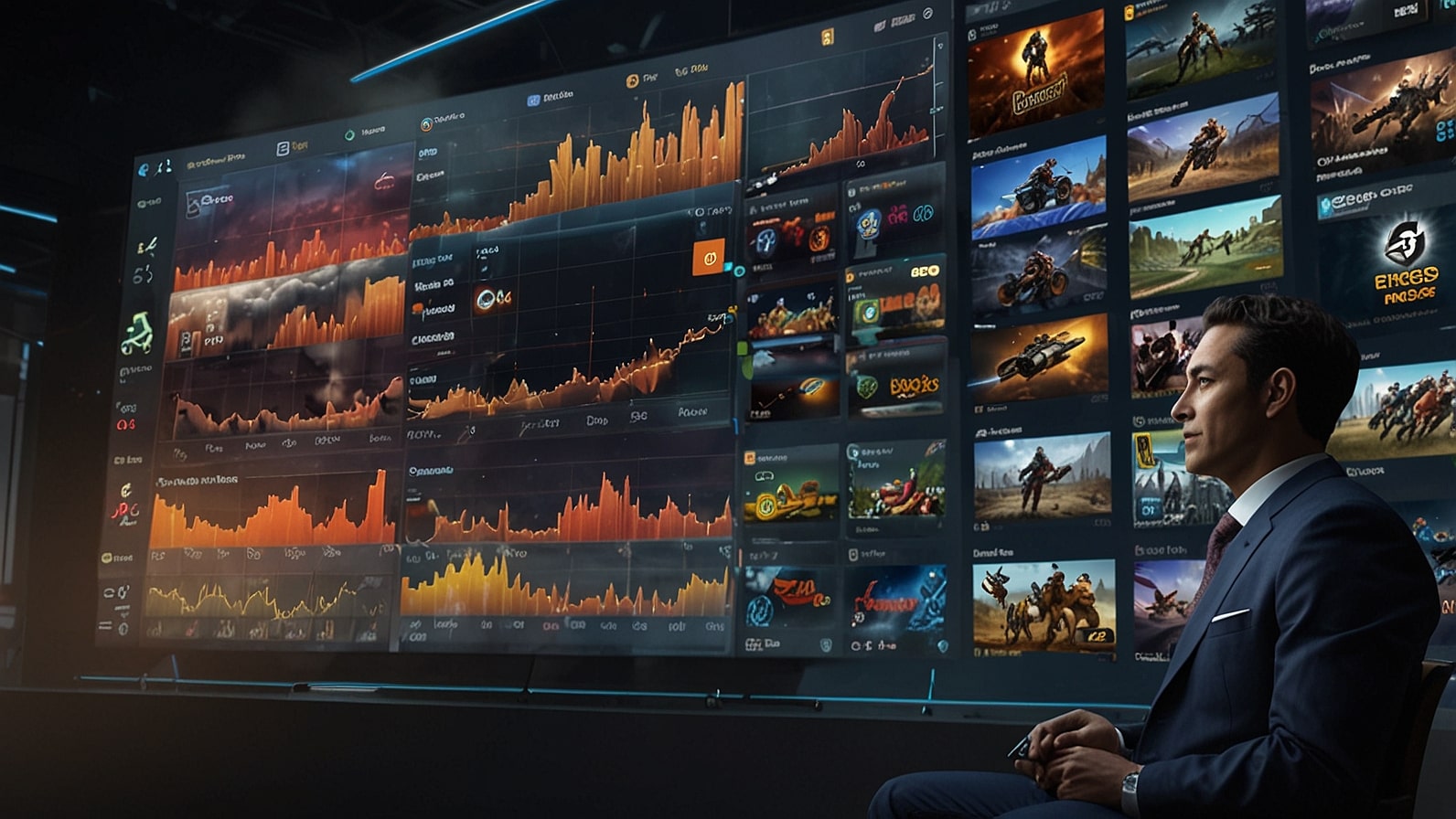
Electronic Arts Stock Skyrockets 15% on Rumors of Record-Breaking $50 Billion Takeover Bid
On Friday, it gained more than 15%, closing at an unprecedented high of 185.42 in almost a decade. The frenzied rally that resulted in an increase in the market capitalisation of the company by a value of over 10 billion was sparked by the news of the impending $50 billion leveraged purchase of the company by a group of investors and fine art tech giants, and made the firm one of the largest in the history of games. When the news of the bid went around Wall Street, investors jumped in, hoping for a premium payout that would change the future of EA as the industry consolidated.
The rumour started circulating early during the trading session, with people familiar with the situation reporting that there were high-level discussions between the Blackstone Group and a large, formidable Asian technological group. Provided it is consummated, the takeover would surpass the most recent mega deals ever, such as Microsoft acquiring Activision Blizzard, which at the time was a 68.7 billion dollar deal, though inflated and adjusted to the current market environment. The original home of blockbuster properties such as FIFA, Madden NFL, and The Sims, EA has long been regarded as a crown jewel that could be merged to counter declining growth in the traditional console gaming business.
Takeover Talks: Is it the Game Changer for the Giants of Gaming?
The strong portfolio of EA and transition to live services and mobile gaming are at the core of the speculation and have enabled steady revenue flows even as the industry has experienced some headwinds. The financial third-quarter performance announced earlier this month highlighted a 5% annual revenue growth to 1.98 billion, which was driven by the successes of such titles as EA Sports FC 24 and Apex Legends. The net bookings reached higher than expected levels of $1.65 billion, and the full-year forecasts were increased to $7.4 billion, indicating that things are going well with the digital transformations.
However, there is a lot of pressure under the hood of EA. The gaming industry, estimated at an annual $200+ billion worldwide, is struggling with post-pandemic normalisation, the amount of player engagement is low, and game development expenditures have exploded to $200-300 million on AAA titles. The necessity of scale can be underlined by layoffs throughout the sector and recent ones at EA, with 670 jobs lost in 2024. Proponents believe that a buyout would supply the capital influx needed to make bold acquisitions and research in the new space, like cloud gaming and esports.
Thealogy
The alleged bidders have complementary advantages. Blackstone, which manages assets of up to $1 trillion, has specific interests in splitting up media content to gain efficiency, including its investment in Universal Music Group. The Asian unnamed partner—assumed to be Tencent or SoftBank—may speed up the growth of EA in booming markets such as China and Southeast Asia, where mobile gaming is the leading force. It is not a cash-out as some industry executives noted, but a strategic merger that can power the EA IP library, which may result in a supercharge. The terms of the deal have been reported to be based on a 40 per cent premium over the close on Thursday and financed by low-interest debt at a stable global rate.
Those who question but warn that the challenges posed by regulation are high. U.S., EU, and UK antitrust regulators have become even more vigilant since the time of Activision and are reviewing transactions that may create market dominance. The sports simulation market domination of EVA—more than 80 per cent of American football and soccer games—could be subject to study into anti-competitive bundling. Besides, activist investors such as Starboard Value a year ago who insisted on board changes may complicate any negotiations should they insist on concessions.
The Rush on the market: Waves across Tech and Entertainment
The EA surge was felt in other related sectors and made a bigger rotation into other media and entertainment stocks. Take-Two Interactive, the Grand Theft Auto publisher, rose 8 per cent in sympathy, and activist publisher Activision Blizzard parent Microsoft rose 2% on a new wave of M&A excitement. Pure-play console manufacturers such as Sony, on the other hand, fell 1.5% as the threat of content supply destabilisation in the event EA restructures its studios escalated.
At the macro level, the news came during a strong U.S. economy with Friday’s PCE inflation reading at 2.4%—mediocre enough to maintain the rate-cut probability at 85% in all of September per futures markets. The S&P 500 broke through with a 0.3% increase, and the Nasdaq increased 0.5%, with tech-concentrated indices shunning valuation fears. The volume of EA increased to 45 million shares, compared to its 10 million average, and intraday volatility rose to 20 per cent, as retail traders on sites such as Robinhood were flooding in.
Options markets were a story of excess: the volume of calls shot up 300 per cent, and there was heavy activity at the $200 level and the $220 level. Implied January expiries volatility shot to 45, and implied a 10% move up or down. The derivatives trader at a big bank joked that with the acquisition of EA, it would be a breakout story by 2025—the buyout fever. The rally negated a significant portion of the underperformance in the stock that had outpaced the S&P 500 by 12 per cent in the year-to-date, in a wider industry underperformance.
To put it in context, EA’s current valuation is 22 times forward earnings, a discount to other similar companies such as Roblox with 35x, owing to its fully developed cash flows, and last year had $1.1 billion in free cash flow. The post-deal privatisation might help to unlock the value of cost synergies, and this could aim to achieve savings of 500 million per year through common back-office operations and supply chain efficiencies.
The Strategic Crossroads: Innovation or Consolidation? at EA
To further elaborate, the allure of EA is the fact that it has evolved out of disk-based sales to a subscription-based model. Its game service, EA Play, which is included with Xbox Game Pass, has 40 million subscribers and brings in recurring revenue that now makes up 60 per cent of overall sales. Current successes such as the revival of Battlefield 2042 and the upcoming Skate reboot indicate that it is not going away, although it continues to face problems: antitrust lawsuits against loot boxes and diversity scandals have stained its image.
Under CEO Andrew Wilson, the company has pursued a player-first strategy and has spent $1.5 billion on metaverse adjacent technology and generative AI to create procedural content. These may be expedited by a buyout, potentially incorporating into the VR/AR ecosystems of the bidders. But integration risks are a reality—cultural conflicts stifled deals such as the Disney LucasArts acquisition.
The response of Wall Street was mixed. Bullish commentaries by other companies, such as Wedbush, restated Outperform ratings and set targets of $220, with commentary of transformational upside. Bears at Barclays sounded the alarm on overpayment, holding it at $160, claiming that the premium contains excessively high optimism. Gaming M&A is coming back, but at what price to innovation? pondered one analyst.
Greater Implications: A New Deal-Making Age?
This would be a megabuy, highlighting a revival in the interest of private equity investment in tech, which had not occurred since the hikes in interest rates in 2022. Firms have a global dry powder of $3 trillion, so they are looking at assets that have lower multiples. In the case of gaming, it is a sign of a new age of consolidation: there are whispers of Warner Bros. Discovery shedding Rocksteady or Embracer Group disposal units.
Adjacent investors, such as semiconductor vendors of GPUs, cloud vendors of streaming, looked on with some apprehension, since a closed-up EA would divert capex flows. Larger funds such as the VanEck Video Gaming ETF increased 4 per cent, the most it has risen since the AI boom of Nvidia.
Horizon Ahead: Deal or Mirage?
The board of EA has a defining decision to make as they head to the weekend. Sources tell us that a formal bid might be made by mid-October; however, leaks indicate that due diligence is being done. It was a hint that Wilson mentioned in a recent interview about exciting partnerships, but with no details.
In the event of a deal failure, the shares would fall by half the amount, but the basics are good, i.e., dividend increases and buybacks should act as a floor. Nonetheless, success throws EA into the private hands, which may give rise to the next gaming unicorn at IPO.
This takeover saga proves once again that in business, the biggest levels are off-screen. In the case of EA, dealmakers are now in control of the control, and the high score is attainable.



 Bitcoin
Bitcoin  Ethereum
Ethereum  Tether
Tether  XRP
XRP  USDC
USDC  Solana
Solana  TRON
TRON  Lido Staked Ether
Lido Staked Ether  Cardano
Cardano  Avalanche
Avalanche  Toncoin
Toncoin